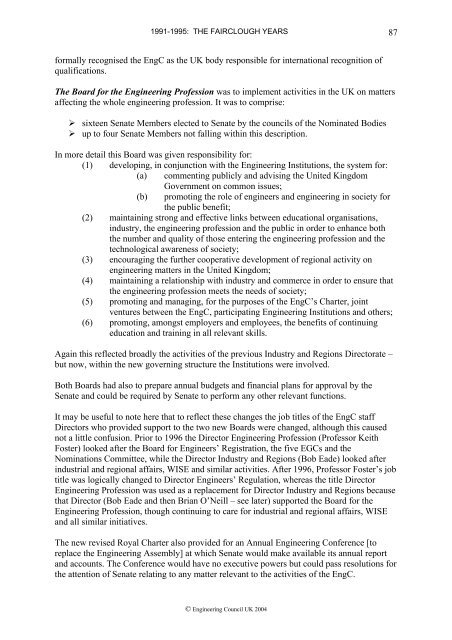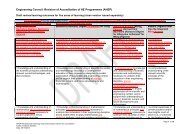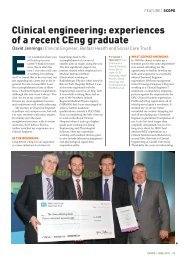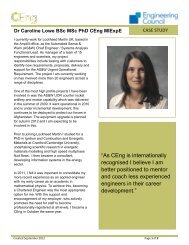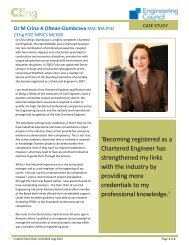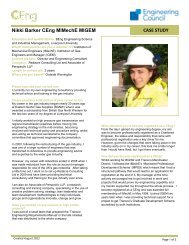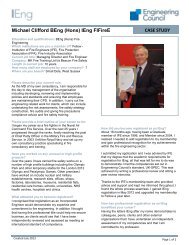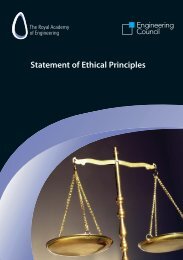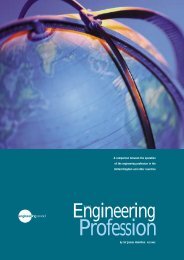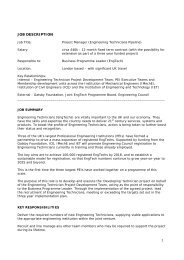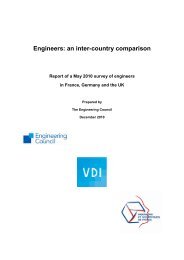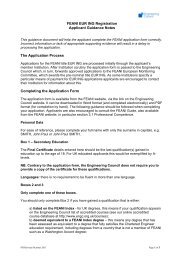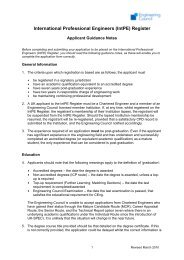An Engine for Change - A Chronicle of the Engineering Council
An Engine for Change - A Chronicle of the Engineering Council
An Engine for Change - A Chronicle of the Engineering Council
You also want an ePaper? Increase the reach of your titles
YUMPU automatically turns print PDFs into web optimized ePapers that Google loves.
1991-1995: THE FAIRCLOUGH YEARS 87<strong>for</strong>mally recognised <strong>the</strong> EngC as <strong>the</strong> UK body responsible <strong>for</strong> international recognition <strong>of</strong>qualifications.The Board <strong>for</strong> <strong>the</strong> <strong>Engine</strong>ering Pr<strong>of</strong>ession was to implement activities in <strong>the</strong> UK on mattersaffecting <strong>the</strong> whole engineering pr<strong>of</strong>ession. It was to comprise:‣ sixteen Senate Members elected to Senate by <strong>the</strong> councils <strong>of</strong> <strong>the</strong> Nominated Bodies‣ up to four Senate Members not falling within this description.In more detail this Board was given responsibility <strong>for</strong>:(1) developing, in conjunction with <strong>the</strong> <strong>Engine</strong>ering Institutions, <strong>the</strong> system <strong>for</strong>:(a) commenting publicly and advising <strong>the</strong> United KingdomGovernment on common issues;(b) promoting <strong>the</strong> role <strong>of</strong> engineers and engineering in society <strong>for</strong><strong>the</strong> public benefit;(2) maintaining strong and effective links between educational organisations,industry, <strong>the</strong> engineering pr<strong>of</strong>ession and <strong>the</strong> public in order to enhance both<strong>the</strong> number and quality <strong>of</strong> those entering <strong>the</strong> engineering pr<strong>of</strong>ession and <strong>the</strong>technological awareness <strong>of</strong> society;(3) encouraging <strong>the</strong> fur<strong>the</strong>r cooperative development <strong>of</strong> regional activity onengineering matters in <strong>the</strong> United Kingdom;(4) maintaining a relationship with industry and commerce in order to ensure that<strong>the</strong> engineering pr<strong>of</strong>ession meets <strong>the</strong> needs <strong>of</strong> society;(5) promoting and managing, <strong>for</strong> <strong>the</strong> purposes <strong>of</strong> <strong>the</strong> EngC’s Charter, jointventures between <strong>the</strong> EngC, participating <strong>Engine</strong>ering Institutions and o<strong>the</strong>rs;(6) promoting, amongst employers and employees, <strong>the</strong> benefits <strong>of</strong> continuingeducation and training in all relevant skills.Again this reflected broadly <strong>the</strong> activities <strong>of</strong> <strong>the</strong> previous Industry and Regions Directorate –but now, within <strong>the</strong> new governing structure <strong>the</strong> Institutions were involved.Both Boards had also to prepare annual budgets and financial plans <strong>for</strong> approval by <strong>the</strong>Senate and could be required by Senate to per<strong>for</strong>m any o<strong>the</strong>r relevant functions.It may be useful to note here that to reflect <strong>the</strong>se changes <strong>the</strong> job titles <strong>of</strong> <strong>the</strong> EngC staffDirectors who provided support to <strong>the</strong> two new Boards were changed, although this causednot a little confusion. Prior to 1996 <strong>the</strong> Director <strong>Engine</strong>ering Pr<strong>of</strong>ession (Pr<strong>of</strong>essor KeithFoster) looked after <strong>the</strong> Board <strong>for</strong> <strong>Engine</strong>ers’ Registration, <strong>the</strong> five EGCs and <strong>the</strong>Nominations Committee, while <strong>the</strong> Director Industry and Regions (Bob Eade) looked afterindustrial and regional affairs, WISE and similar activities. After 1996, Pr<strong>of</strong>essor Foster’s jobtitle was logically changed to Director <strong>Engine</strong>ers’ Regulation, whereas <strong>the</strong> title Director<strong>Engine</strong>ering Pr<strong>of</strong>ession was used as a replacement <strong>for</strong> Director Industry and Regions becausethat Director (Bob Eade and <strong>the</strong>n Brian O’Neill – see later) supported <strong>the</strong> Board <strong>for</strong> <strong>the</strong><strong>Engine</strong>ering Pr<strong>of</strong>ession, though continuing to care <strong>for</strong> industrial and regional affairs, WISEand all similar initiatives.The new revised Royal Charter also provided <strong>for</strong> an <strong>An</strong>nual <strong>Engine</strong>ering Conference [toreplace <strong>the</strong> <strong>Engine</strong>ering Assembly] at which Senate would make available its annual reportand accounts. The Conference would have no executive powers but could pass resolutions <strong>for</strong><strong>the</strong> attention <strong>of</strong> Senate relating to any matter relevant to <strong>the</strong> activities <strong>of</strong> <strong>the</strong> EngC.© <strong>Engine</strong>ering <strong>Council</strong> UK 2004


